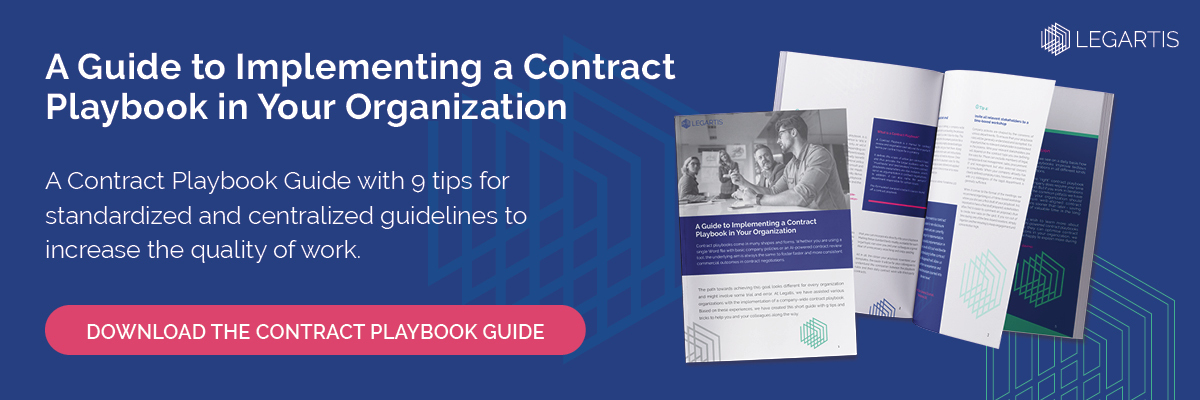Legal departments today are facing increasing pressure. 75% of legal departments report that their workload is growing faster than their budgets. As a result, work is starting to pile up, especially in the area of contract review. The number of contracts has already increased by 38% in the last six years, turning the legal department into a bottleneck that impedes quick contract conclusions and delays revenue generation. 57% of business development managers confirm that this is the case.
This is where a LegalTech (Legal AI) solution can help. It can speed up processes and increase productivity, leading to a seamless collaboration between legal and business departments and thus to a more effective use of business opportunities.
While legal departments actively search for tech solutions to help with these problems, they often find themselves facing internal hurdles. Therefore, if you want to convince management to invest in LegalTech, you’ll need strong arguments regardless of how remarkable the solution is. Our guide will help you craft this successful presentation.
6 Steps to a Successful LegalTech Pitch
Do you want to, for example, speed up the contract review process with the support of technology? Before you make the pitch to your management team about a software for automated contract review, make sure you understand the significance of the contract review process itself. From non-disclosure agreements, contract data processing agreements, and departmental business contracts to partner or supplier contracts, there’s hardly a day in the department without a contract to review.
Contract review is a key stepping stone on the way to value creation (sales with the help of AI). Thus, simplifying the process with the help of LegalTech is not only in the interest of the legal department, but also of management.
1. What is the Problem?
To begin the presentation, describe the current work situation in the legal department (after all, their towering workload will have consequences). Contracts pending review are piling up. The contract review process has become a blockage, hindering departments from reaching a business conclusion quickly. The lawyers complain that they can no longer concentrate on organisationally critical legal issues.
Give concrete examples from your company's typical workday that already illustrate this problem. Talk to colleagues in advance and, if possible, use concrete statements from affected employees. Use figures to illustrate delays and productivity losses as a result of this inefficiency.
2. What would the ideal outcome look like?
Of course, you could now directly present the solution and your desire to invest in contract review software. However, to generate higher emotional receptivity, you should first think about the goal and create a mental image of this outcome so incredible your management will be thrilled about the idea of integrating the software into the company.
How could the right technology simplify and speed up contract review workflow? How could risks be minimised and the quality of contract review be elevated if you work with LegalTech? Again, try to be as specific as possible, using key performance indicators. Only discuss success metrics that are relevant to your company and that you could measure yourself if management decided in favour of the project.
Tip: Ask providers of LegalTech solutions for statistics from their reference clients. In most cases, they will be happy to provide you with suitable argumentation material.
3. What motivates your stakeholders?
When visualising the goal scenario, consider your audience and their motivations. Nip any possible objections in the bud before they can even be discussed. For example:
- If you need IT’s approval, reduce pushback by describing why the new software will not constitute high IT-support and administration costs.
- If you have to convince the CFO, collate and present your figures even more carefully, and calculate the costs of a non-investment, for example.
- If your managing director comes from a specialist department themselves, they probably already know the annoying waiting time associated with approval from the legal department. In this case, make sure to focus mostly on accelerating the process for operations.
No matter which stakeholders you need to win over for your project, put yourself in their shoes. Try to convey the implementation of the software as a win-win situation for all parties involved. After all, it’s not only corporate counsel who gain free working time with the introduction of the software. Many other areas of the company will also benefit, directly or indirectly.
4. What is the plan?
Once you’ve made clear the need for and the advantages of a LegalTech solution for your company, concretise your plans more clearly:
- Which software do you want to implement and what are its advantages compared to its competitors?
- How many users will work with the application initially, and how many will do so in the future?
- How time-intensive is the given implementation project and how long will the implementation itself take? Find out whether your chosen provider offers a lean onboarding process.
- What are the one-off and running costs of implementing and operating the software?
- How easy is it to integrate the proposed solution with any other tools you use?
- How technically demanding will future updates be? Explain whether these will require any special knowledge or arrangements.
5. Why is the investment worth it?
Since an investment in LegalTech is initially quite significant, conclude your pitch with an explicit overview of the quantitative and qualitative benefits of a specific application. Show the extent to which the investment will pay off in the future.
Here is a list using Legartis' LegalTech solution as an example:
|
Quantitative Success Measures |
Qualitative Success Measures |
|
70% reduction of contract processing time. |
Elimination of repetitive, tedious audit work: increase in productivity within legal departments |
|
80% reduction of the time needed by the legal department per contract review |
Increased satisfaction among lawyers, as they can focus on more essential tasks. |
|
Speeding up of contract conclusions from 4 weeks to 1 week in specialist departments. |
Better cooperation between legal and other specialised departments. |
|
Risk minimisation by an estimated 95% (every contract is checked in a standardised way, giving lower error rates). |
Independence from legal expertise: departments can check routine contracts themselves using this software. |
|
Increased stability and planning reliability of the legal department’s workday. |
Standardisation and objectification of contract review criteria limit discussions and promote team spirit. |
|
Digitalisation boost in the legal department |
6. What are the next steps?
Provide insight into how a pilot project would go. Visualise the steps that would take place in the first week, the first month, and until the go-live stage. This will give the decision-makers a sense of how much the day-to-day business would be facilitated and what impact their approval would have on existing workflow processes.
Outcome
Ultimately, the purpose of a software or technology is to solve tasks that pose a problem for its users. Therefore, your presentation to management should convincingly demonstrate the gains and benefits of the proposed LegalTech solution. Outline the status quo of the legal department in the context of your company's value creation process.
Illustrate clearly what impact the proposed LegalTech application will have on the company and its departments, supporting this argument with numbers, data and facts. This also includes qualitative gains, such as higher satisfaction in the departments, which has been proven to lead to higher productivity.
Do you want your contract review to become standardised, risk-minimised, and scalable across departments? With Legartis' artificial intelligence application, this is possible. We support you right from the start in working out how Legartis can add value to your business.
Book a non-binding consultation now.
Recommended Articles
Reviewing NDAs in Companies: Why Standard Templates Are Risky
Non-disclosure agreements (NDAs) are among the most frequently used contracts in organisations. They are signed every day – between Sales and potential clients, between HR and..
Contract Reviews with ChatGPT? Chances, Risks, Alternatives
A contract is uploaded or pasted into the interface. ChatGPT is asked to highlight risks, explain clauses or provide recommendations. The motivation behind this is..
Agentic Legal AI: When AI Shifts from Assistant to Actor
The days when AI in the legal industry was little more than a glorified spell checker are over. What sounded like science fiction just a few years ago is now reality: Agentic..



